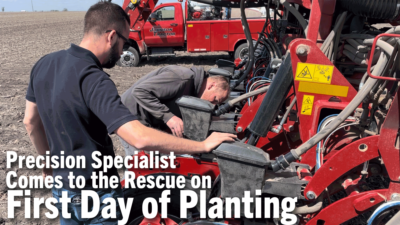In the case of the Kubota and Land Pride pact, the tractor maker will actively market the Land Pride line of implements under the Land Pride label while both maintain their corporate brands.
From the dealer's perspective, various questions arise, like what will the Kubota dealers that already carry competing lines of implements do? And does the agreement offer those dealers already carrying both brands a decided advantage over those in the same sales territory that only carry the implement line?
The two firms say the marketing partnership will allow the more than 1,000 U.S. Kubota dealers to offer "Kubota-matched" implements, providing customers with a "one-stop" location for both their compact and utility tractors and implements.
In an interview with Farm Equipment in early September, Linda Salem, president of Land Pride, said, "The strategy is to further penetrate the rural lifestyle market. Kubota offers primarily tractors, front-end loaders and backhoes along with a few other implements. Because of their limited range of implements, they were looking to round out their offerings in a more creative way than through purchasing another company or doing an OEM relationship. A lot of our dealers are already Kubota dealers," she added. Despite its network of some 1,500 dealerships, Land Pride's agreement with Kubota gives the implement manufacturer the opportunity to move into market territories where it has little or poor exposure currently.
Roy Applequist, president and owner of Great Plains, says that for most rural lifestyle customers, the tractor purchase takes precedence and most don't have a brand preference when it comes to implements.
"Often, they buy a tractor and whatever the dealer packages together with the tractor. This gives both Land Pride and Kubota the opportunity to match a high-quality tractor with high-quality implements."
In fact, he says, "We offer equipment in colors, so most likely the Kubota dealer will want orange implements to go with its orange tractors."
Applequist also points out that while Kubota is often associated with the rural lifestyle-type customer, the tractor maker also has a strong position in the construction market where higher-quality, dependable tools are required. So, the alliance with Land Pride will also benefit Kubota in this market segment, he says.
The Frontier Factor
Many dealers and shortline equipment manufacturers point to John Deere's establishment of the Frontier line of implements in 2001 and marketing the brand as the largest shortline company in the world as the real impetus for the Land Pride-Kubota coalition — and probably many more like it to come.
"I think Land Pride felt the effect of losing John Deere dealers' orders to Frontier-labeled equipment and needed to ensure their continued distribution. They took the Frontier model, but kept their own brand name," says James Taylor of Hillsboro Equipment, a John Deere and Land Pride dealer in Hillsboro, Wis.
Land Pride executives acknowledge that John Deere's strategy of promoting its Frontier brand of implements is forcing shortline implement manufacturers to adopt a more aggressive approach with their distribution channels.
"Certainly, the green guys are squeezing out a lot of shortliners and in order for us to succeed, we need to make sure that we're in a strong position with the remaining dealer networks," says Salem. "It'll certainly give us a stronghold that we believe will grow with the Kubota dealerships and in a much more customer-friendly way."
John Deere, on the other hand, says its approach in introducing and promoting its Frontier line of implements isn't aimed at "cornering the market," according to Michael Horrell, marketing manager for Frontier Equipment. "We were looking to improve the business model across the board for our dealers," he says.
Horrell says that in 2000, John Deere determined it needed to become a full-spectrum supplier of products and remove some of the complexity of the dealer's business model.
"We created a different business model thanwhat Kubota and Land Pride later developed. What we chose to do was develop our own brand and business model to provide the products our dealers were getting from other suppliers," he says.
To simplify the dealer model, he explains, John Deere took a lot of the dealer-side complexity on itself. "We negotiate for product and pricing and now offer over 448 different types of implements that are available exclusively through John Deere to its dealers, and we're continuously growing the Frontier line," says Horrell.
"Most of these products are not specifically designed for Frontier. They were products available to dealers under another brand. We work diligently to make sure our pricing is comparable so there's no advantage for our dealers to buy it under the other brand. There are always going to be exceptions, but as a rule we strive to keep Frontier implements competitively priced."
What this does, according to Horrell, is allow its dealers to work with a single supplier. "With the combination of John Deere and Frontier, they get all the products their customers need. It has a consistent look and feel to it. Although we don't design the equipment, we have a staff of Deere engineers that work with the suppliers to make sure it's safe, functional, compatible and reliable."







Post a comment
Report Abusive Comment